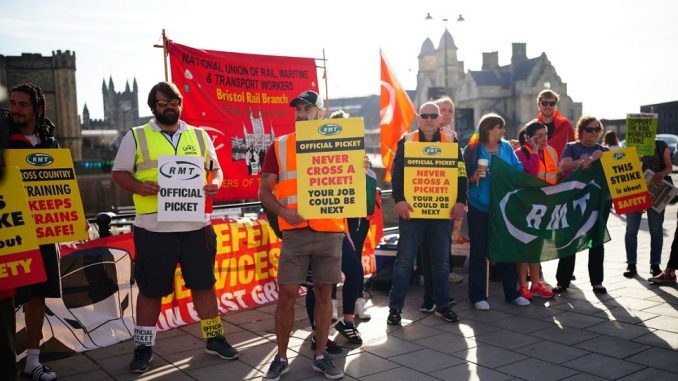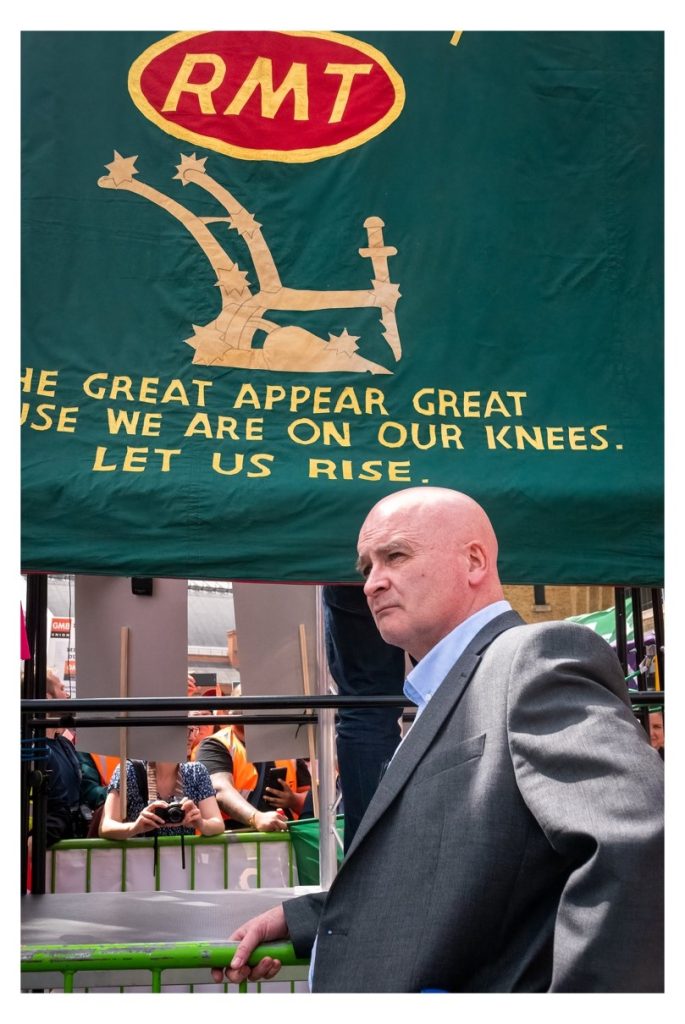
By Ronnie Turus – University and College Union (UCU) activist.
RMT (The National Union of Rail, Maritime and Transport Workers) union took their first day of national strike action across the country on 21 June. The strikers were out again on 23 and 25 June. This is the biggest rail strike in 30 years. This is a historic action since 1989 for RMT members.

RMT balloted over 40 000 members for strike action in May 2022. 71% of those who voted took part in the vote with 89% voting in favour of strike action. RMT demands an 11% pay increase, no compulsory redundancy and decent work conditions.
The employer is trying to slash over 2500 jobs, refusing to increase salaries alongside the inflation, and refusing to provide safe conditions for the workers.
RMT workers, like millions of others, did not get a pay rise last year. The union’s calculation demonstrates that a worker earning £35 000 has already lost spending power around £3150. If there isn’t any pay increase this year, then the loss of spending power will be equivalent to £7788.
The rail companies are threatening passengers and rail workers with cuts, the companies made a fortune during the Covid-19 pandemic. The companies that operate trains made £300 million profit, the companies who own the trains made £949 million and those companies who repair tracks made £235 million during the Covid-19 pandemic.

Why does RMT rise? The current cost of living crisis is taking a toll on the workers across the country. The rail industry workers are sufficiently organised to push back. While this makes RMT a target for Britain’s reactionary, anti-union, workers hating media, for the rest of the workers, RMT members point the way for decent pay increase and working conditions.
The cost of living crisis is hitting working class people hard. More than 20% of households say they are struggling to make ends meet as inflation rises 11% which is the highest level in 40 years. Nine in 10 people are worried about the rising prices of food. Energy (gas, petrol, electricity) prices have doubled. It is estimated that 40% of Britons could fall into fuel poverty in the coming winter. Working class families are forced to choose between heating and eating.
The UK government is terrified that other workers will be inspired by RMT’s strike and can use it to demand better wages, conditions, job security and pension schemes. The government is already planning new laws to break the strike actions by employing agency staff. The government is using Covid and war in Ukraine to silence its critics. However, this may fail. It depends how workers and unions will come together for coordinated strikes and actions.
There is a possibility of teachers and NHS (National Health Service) staff to strike over pay later this year. The NASUWT (National Association of Schoolmasters/Union for Women Teacher) and NEU (National Education of Union), two main teachers’ unions, are preparing to strike if the government does not increase pay alongside inflation. This comes as doctors, nurses, other health care staff, civil servants, postal workers, BT (British Telecoms) engineers and traffic wardens are contemplating industrial action over spiralling cost of living.
As a surprise, for the first time, criminal barristers (lawyers that represent complex cases in the court) are planning to strike from 27 June. Barristers are always regarding well-paid sections of society. However, spiralling living cost is not only affecting only traditional workers but so-called white colour workers, too.
The ruling class is panicking. The unions were shattered by a combination of defeats, mass unemployment and legislation in the 1980s by Margaret Thatcher. A government MP, Tobias Ellwood, claimed that the strike action [of RMT] was playing into Russia’s hand urged unions: “Don’t be Putin’s friend”. The Sun’s, tabloid newspaper, front page on Wednesday declared a “class war”. Mick Lynch, the general secretary of the RMT, was asked if he was “into revolution and bringing down capitalism”.
And now, the courage of train drivers and railway workers could provide the spark, and inspiration for other workers to come together and fight back against low pay, anti-democratic union laws, racism and dangerous working conditions. This is a fight that the workers and unions cannot afford to lose.








